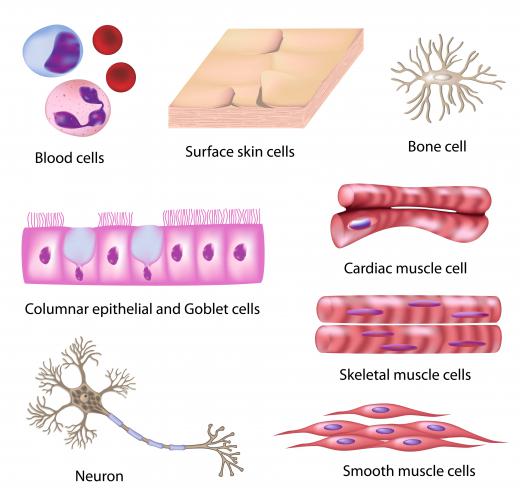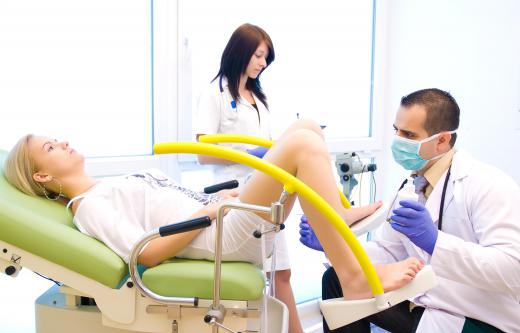What is Cytology?
 Tricia Christensen
Tricia Christensen
Cytology, more commonly known as cell biology, studies cell structure, cell composition, and the interaction of cells with other cells and the larger environment in which they exist. The term "cytology" can also refer to cytopathology, which analyzes cell structure to diagnose disease. Microscopic and molecular studies of cells can focus on either multi-celled or single-celled organisms.
That fact that we as humans are made up of millions of tiny cells, and that other lifeforms around us are similarly constituted, now barely needs explanation. The concept of the cell is relatively new, however. The scientific community did not accept the idea of the existence of cells until the late 18th century.

Recognizing the similarities and differences of cells is of the utmost importance in cytology. Microscopic examination can help identify different types of cells. Looking at the molecules which form a cell, sometimes called molecular biology, helps in further description and identification. All fields of biology depend on the understanding of cellular structure. The field of genetics exists because we understand cell structure and components.

Another important aspect in the discipline of cytology is examining cell interaction. By studying how cells relate to other cells or to the environment, cytologists can predict problems or examine environmental dangers to cells, such as toxic or cancer-causing substances. In humans and other multi-cellular structures, cytology can examine the presence of too many of one kind of cell, or the lack of enough of a certain kind of cell. In a simple test like a complete blood count, a laboratory can look at white blood cells and identify the presence of an infection, or it may examine a low level of certain types of red blood cells and diagnose anemia.

Certain autoimmune disorders can be diagnosed by abnormal cell reactions. Hashimoto's thyroiditis, for example, is an autoimmune condition caused by abnormal cell reaction. Instead of white blood cells recognizing the presence of normal thyroid cells, these antibodies attack them, causing low thyroid. If untreated, this condition can result in retardation, extreme fatigue, obesity, and ultimately death. Through cytology, the abnormal reactions of these antibodies can be recognized, and treatment can be undertaken long before this condition creates irreversible problems.

Cytopathology has similar aims, but tends to look for cells that should not be present in an organism. Urinalysis and blood tests, for example, can scan for the presence of parasites or bacteria which can cause illness and death. Hence, in cytology, understanding single-celled organisms like many forms of bacteria is as important as understanding multi-cellular structures.

This is also one of the main diagnostic tools for detecting cancer. A woman's yearly gynecological exam almost always involves a pap smear, a collection of tissues that are analyzed at the cellular structure to detect early formations of cancer cells. Early detection can lead to greater survival rates. Similarly, needle biopsies of lumps in the breast or elsewhere can detect cancer cells and provide an excellent means for diagnosis.
AS FEATURED ON:
AS FEATURED ON:















Discussion Comments
Cytology is changing. After you take the program, make sure you also take computers and molecular pathology and minor in cytogenetics. A masters degree, usually a MPH or Phd is required. Also if you want to know, you are better off in pharmacy.
Can someone explain about oral cytology? Is there a big division of it such as oral exfoliation cytology?
I have a report about cytology in our biology class. please help.
tell me all about cytology and its studies.
This website is really good. I am currently doing an essay and it was very useful. If you don't mind me asking, what further tests can be done after a cytology test due to abnormal results?
Thank you so much. But i have some assignments like:
Which cavity is enclosed by the hip bones?
The lungs are covered by a membrane known as?
In which stage of cell division do homologous chromosomes separate?
Why are solute and water concentrations inversely related?
Where exactly in the abdominal cavity does the liver lie? Thanks a lot.
thank you for the info. can i ask: what is the difference between biology and zoology?
oh thanks very much. I have an assignment like:
name: study of ?
botany --- plant
cytology --- cells
Is this right? -shi
Thanks. The article helped me a lot to find information that was not in my biology book.
Thanks. i got my answers easily.
i am really satisfied with the article. i am really thankful to you.
I am currently considering a MSc in food science but for some unknown reasons this subject came into my vision. I have read the information and have found it to be very informative. It is something that I am definitely interested in and who knows how far I will go with it. The sky is the limit!
Thank you so much! This article was an enormous help to my research paper on Matthias Schleiden. At first I couldn't find a single job that directly related to his work, and once I did, I had trouble finding unique information about cytology that set it apart from the rest. Thanks again! :)
Post your comments